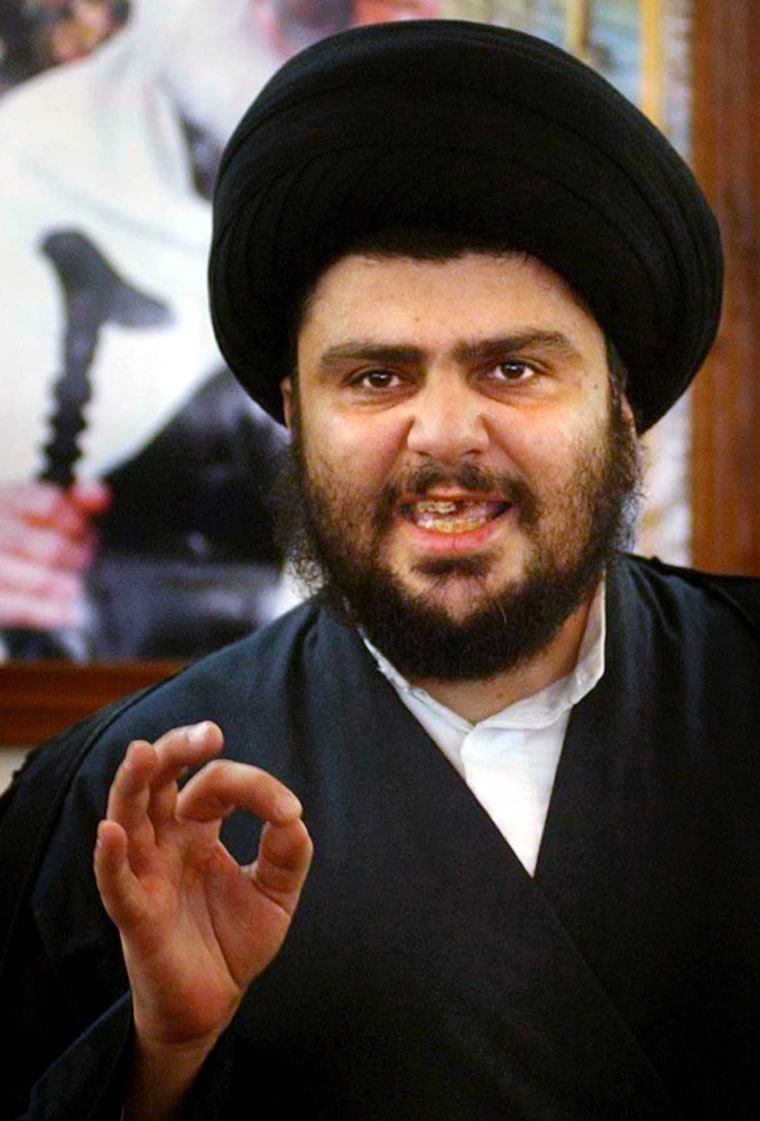Rebel cleric Muqtada al-Sadr, whose militia is clashing with U.S. and Iraqi forces in Shiite areas across the country, said Monday he would not lay down arms or leave the holy city of Najaf.
Al-Sadr spoke at a news conference in his first public appearance since the new wave of fighting between his Mahdi Army militia and U.S. and Iraqi forces broke out on Thursday.
"I will continue fighting," al-Sadr told reporters. "I will remain in Najaf city until the last drop of my blood has been spilled."
Government officials have said many of those involved in the Najaf violence were criminals and implied they were not true followers of the popular Shiite firebrand. But al-Sadr said the militants were his followers and described them as volunteers fighting for an honorable cause.
"These are honest attacks against the occupation." he said, referring to the U.S. troop presence in the contort. "They ... are coming to resist the occupation, to liberate our country."
Negotiated settlement
On Saturday, an aide to al-Sadr said the rebel cleric wanted a negotiated settlement to the bloody conflict.
Ali al-Yassiri urged the interim government to take the cleric’s offer seriously, saying scores of civilians had been killed in Najaf and in fighting that has spread to Baghdad.
“The door is open and will remain so as rivers of blood flow in Najaf,” Yassiri, al-Sadr’s political liaison officer, told a news conference.
“What we are seeing is a violation of human rights. The occupying forces have a lust for violence and Iraqi officials are sadly adopting the language of (ousted Iraqi leader) Saddam Hussein,” he added.
U.S. forces fought al-Sadr’s Mahdi Army militia in Najaf for a third day on Saturday as casualties mounted in the worst bout of fighting in Iraq in four months.
The fighting has destroyed a two-month-old ceasefire between U.S. forces and the Mahdi Army, of whom the U.S. military said it had killed more than 300 fighters.
‘Positive messages’
Earlier on Saturday, Prime Minister Iyad Allawi said he was getting “positive messages” from al-Sadr and urged him to join the political process that is scheduled to culminate in elections next January.
Al-Sadr, who hails from a family that led opposition to Saddam, is one of the most vocal opponents of what some still see as a U.S.-led occupation of Iraq.
His followers still consider themselves dispossessed more than a year after the U.S.-led invasion that toppled Saddam, a Sunni who marginalized Iraq’s Shiite majority.
Al-Sadr is wanted in connection with the murder of Sayyed Abdel Majid al-Khoei last year, although a warrant to arrest him has not been enforced.
A number of Shiite political parties rallied around al-Sadr on Saturday.
The Shiite Political Council, a grouping of mostly small 42 parties, said al-Sadr represents a force to be reckoned with and the U.S. attacks on his followers are an affront to Iraqi Shiites.
“Al-Sadr has a real presence. People are asking why the (Sunni) cities of Fallujah and Samarra are left lawless while Najaf is targeted,” said council member Mariam al-Rayes.
Abdel Karim Mohammadawi, a tribal leader from Iraq’s southern marshlands, said al-Sadr expresses Shiite aspirations for better living standards throughout Iraq.
“Iraq cannot embrace democracy with more killings,” he said. “We are with the rule of law and sovereignty, but we had enough. We cannot remain dispossessed.”
